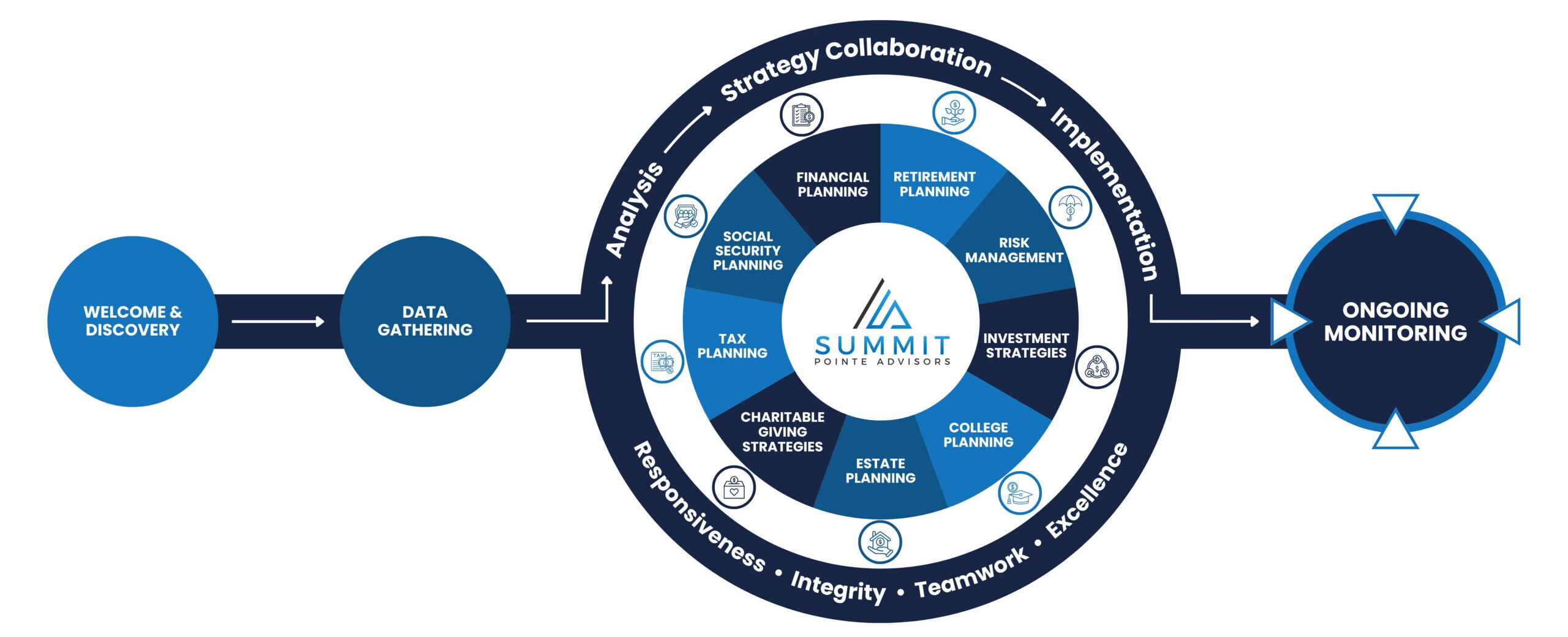Business Planning
Simplifying Business Planning
Financial planning with a financial advisor is a collaborative process. This is especially true for business planning, where planning can be more complex. We make the most of your planning by working in conjunction with attorneys and accountants to help ensure proper alignment of your business goals in a seamless process.
The overall goal is to help you make informed decisions designed to grow your business in the direction that you want.
Financial planning will look a little different for everyone, but there are some common trends to planning outlined below. The chart below is more of a guideline, with each stage building off the last.

Business Planning
You know what it takes to build a successful business. It takes vision, preparedness, skills and desire – not to mention a focused dedication to achieving your goals. If you are like most business owners, you’ve worked hard and made many sacrifices to grow your business. That’s why you should put just as much energy into protecting it as you did building it.

Financial plan recommendations can be implemented with the advisor of your choosing. Implementation of specific products or services may result in commissions or fees outside of the financial planning fee.
Start Up
Focus: Strategic setup and risk management. Establishing financial stability and building a foundation.

Key Services:
Entity Structure Guidance
Choose the right legal structure (LLC, S-Corp, etc.) for liability protection and tax efficiency. Understand the business structure and tax obligations of your company.
Business & Personal Budgeting
Align personal financial goals with business cash flow needs.
Cash Flow Management
Maintain tight grip on expenses. Explore funding options such as small business loans or grants.
Tax Planning
Coordinate with CPA for estimated taxes, self-employment tax, and deductions.
Insurance Review
Recommend appropriate business insurance (disability, key person, liability). Develop strategies to address unexpected contingencies like a death or disability of owners or key employees.
Retirement Plan Setup
Introduce retirement plan to begin building personal retirement savings.
Emergency Fund Strategy
Review liquidity needs – how much to keep in cash vs. reserve lines of credit.
Key Employee Retention Strategies
Create bonus plan to retain and reward top talent.
Buy/Sell Agreement
Develop buy/sell agreements
Key Services:
Business Valuation Benchmarks*/Strategic Planning
Reassess goals, Introduce longer-term financial forecasting (3-5 years). Track growth and inform decisions around expansion or investor interest.
Team Growth
Plan for hiring, benefits, and retention strategies. Design retirement and health plans to attract and retain talent.
Risk Management
Develop strategies to address unexpected contingencies like a death or disability of owners or key employees.
Profit Margins
Focus on improving margins and reinvesting in high-ROI areas. Developing and understanding your strengths and profitability.
Debt Strategies
Use leverage smartly; ensure debt is structured efficiently. Help balance business debt with long-term capital needs and personal liabilities.
Investment
Consider investing in new tech, product lines, or markets. Guide how and when to diversify business profits into personal investment portfolios.
Tax Efficiency
Optimize for deductions, credits, and possibly restructure- for savings (e.g., S-Corp election). Identify tax-advantaged retirement plans (defined benefit, 401(k), profit-sharing, etc.)
Key Employee Retention Strategies
Create bonus plan to retain and reward top talent.
Buy/Sell Agreement
Review or update buy/sell agreements.
Growth & Expansion
Focus: Scaling operations, improving profitability, and managing risk.

Succession & Exit Planning
Focus: Maximizing value, succession, and wealth preservation.

Key Services:
Succession or Exit Planning
Develop exit strategies – family handoff, selling to partners, or third-party sale. Solidify buy/sell agreements.
Business Valuation Support
Increase business value through strong financials, customer base, and IP. Coordinate with valuation experts.
Tax & Estate Planning
Strategize how to reduce capital gains and estate taxes on sale or transfer.
Diversification
Shift personal wealth outside the business to reduce concentration risk.
Personal Retirement Income Plan
Shift focus to drawing down from investments and planning distributions.
Legacy Planning
Align financial decisions with long-term personal or philanthropic goals. Coordinate with an estate attorney on wills, trusts, and gifting strategies.
Risk Management
Develop strategies to address unexpected contingencies like a death or disability of owners or key employees.
Business Planning Services
Financial Planning
This is a highly collaborative process involving coordination with multiple outside professionals. The process of setting financial goals, creating strategies to achieve them, and managing resources effectively to help ensure long-term success. Financial planning encompasses each of the categories below as part of a wholistic approach.
Key Aspects of Financial Planning:
Goal Setting
Performance Monitoring
Cash Flow Management
Risk Management – prepare for the unexpected
Why It's Important:
Financial planning for your business provides a clear roadmap for resources, building growth, and maintaining financial stability. It helps business owners make informed decisions, anticipate challenges, and seize opportunities with confidence. A solid plan can help businesses put strategies in place that are designed to minimize vulnerability to cash flow issues, inefficiencies and unexpected risks.
Retirement Plans
Setting up retirement plans for both you and your employees is important. Your financial advisor will guide you through selecting and setting up the right plan for your business, balancing cost, tax benefits, and administrative needs.
Key Elements of Retirement Plans:
Plan Selection
401(k) / 403(b) / Profit Sharing
- Solo
- Safe Harbor
- Traditional (pre-tax) / Roth
SEP IRA / Simple IRA
Defined Benefit Plan
Cash Balance
Contribution Planning & Compliance Testing
Ongoing reviews with client and employees
Why It's Important:
Selecting the right retirement plan helps you, as a business owner, build personal wealth in a tax-efficient way while also attracting and retaining talented employees. A well-designed plan will focus on reducing your tax burden, supporting long-term financial security, and shows your commitment to your team’s future. Wise design helps ensure that the plan will fit your business’s size, cash flow, and growth goals.
Executive Benefit Programs & Key-Person Protection
Non-Qualified Executive Benefits
Deferred compensation plans
Split-dollar life insurance plans
Executive bonus plans
Group carve-out plans
Key Person Protection
These people are the most important asset of your business. It would take time and money to replace them. It’s important to understand the cost and time it would take to replace a key employee.
Often, key person protection is handled utilizing term and whole life insurance.
Why Executive Benefit Programs and Key Person Protection is important:
Providing programs like these can incentivize employees to work their hardest and stay with your company for many years to come.
Exit Planning
Types of Exit Planning:
Family handoff
Third-party sale
Selling to partners
Why It's Important:
The goal is to maximize the value of the business and ensure a smooth transition that meet’s the owner’s financial, personal, and legacy goals.
Buy-Sell Agreement
Two types:
Cross Purchase
Co-owners buy out the departing owner’s share
Entity Owned Life Insurance
The company makes premium payments, and if the person dies, the company receives the death benefit. This helps alleviate some of the financial burden of replacing a key person in your company.
Why It's Important:
A buy-sell agreement helps ensure a smooth transition for your company and protects continuity of business. Pre-planning can help reduce the legal and financial risks if the unexpected occurs.
Employee Education
Topics Include:
Becoming financially independent
Employee financial wellness
Planning for Retirement
Common money mistakes
Financial Wellness Overview
Understanding Social Security
Why It's Important:
Employee education empowers your employees and can lead to better decision making and improved retention.
